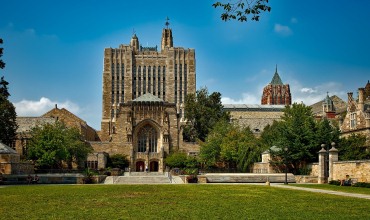Baptist
Definition of the word „Baptist“
“Baptists” comes from the Greek word “baptizein” which is related to the
verb “to immerse or dip” and in figurative sense has the meaning “to
baptize”.
The name “Baptist” was not a self-chosen one. In the early HYPERLINK
“http://en.wikipedia.org/wiki/Reformation” \o “Reformation” Protestant
Reformation time this particular group of HYPERLINK
“http://en.wikipedia.org/wiki/Christian” \o “Christian” Christians
made HYPERLINK “http://en.wikipedia.org/wiki/Baptism” \o “Baptism”
baptism on a profession of faith a condition of church membership. This
rejection of HYPERLINK “http://en.wikipedia.org/wiki/Infant_baptism”
\o “Infant baptism” infant baptism and this insistence on HYPERLINK
“http://en.wikipedia.org/wiki/Believer%27s_baptism” \o “Believer’s
baptism” believers’ baptism were so distinctive of these Christians
that they were stigmatized with the pejorative “Baptists.”
History of Baptismus
During the final years of the 16th century radical groups emerged in the
Anglican church impatient with the church’s slow pace of reform. Many of
these broke away from the established church and became known as
Separatists. One such group was established in Gainsborough,
Lincolnshire under the leadership of Thomas Helwys and John Smith, a
former Anglican preacher.
In 1608 this group moved to Amsterdam in order to escape persecution in
England. In Amsterdam Smith became convinced that baptism should be
available only to those who are convinced believers. Smith baptised
himself and his followers, thus forming the first Baptist church. In
1611 Thomas Helwys and some of his followers returned to London and
established the first Baptist church in England. These came to be known
as General Baptists because they believed that Christ died for everyone,
and not an elect few.
In 1638 a Baptist church was formed in Southwark, London whose theology
was Calvinistic. Those churches that followed this theology came to be
known as Particular Baptists because they believed that only a
particular elect group would be saved.
The Baptist church grew steadily during the first half of the17th
century. However, the restoration of the British monarchy in 1660 led to
renewed persecution of dissenting churches. During this time the Baptist
preacher John Bunyan spent 12 years in prison.
The 18th century saw renewed growth in the church. In 1792 the English
Baptist Missionary Society was organised under the leadership of William
Carey, planting Baptist churches in India and other parts of Asia.
Church membership continued to grow throughout the 19th century.
Concomitant with this growth was the quest to establish cooperation
among different Baptist churches. In 1891 the General and Particular
Baptists were united in the Baptist Union of Great Britain and Ireland.
Baptist churches were also set up throughout central and eastern Europe.
The twentieth century has witnessed a growth in international
cooperation among Baptist churches. In 1905 the World Baptist Alliance
was set up in London. Since then meetings have occurred in different
cities roughly every five years. Today there are Baptists in all
continents of the world.
Membership
Most Baptist churches do not have an age restriction on membership, but
will not accept as a member a child that is considered too young to
fully understand and make a profession of faith of their own volition
and comprehension. In such cases, the pastor and parents usually meet
together with the child to verify the child’s comprehension of the
decision to follow Jesus. There are instances where a person makes a
profession of faith but fails to follow through with believers’ baptism.
In such case they are considered “saved” but not a church member until
baptized.
Some churches, especially in the UK, do not require a member to have
been baptised as a believer, as long as they have made an adult
declaration of faith – for example, been confirmed in the Anglican
church, or become a communicant member as a Presbyterian. In these
cases, believers would usually transfer their membership from their
previous church. This allows people who have grown up in one tradition,
but now feel settled in their local Baptist church, to fully take part
in the day to day life of the church, voting at meetings, etc. It is
also possible, but unusual, to be baptised without becoming a church
member immediately.
Baptist beliefs and principles
Each Baptist believer priest with soul competency is equal to all other
Baptists in a church, so each church is equal to every other church.
Baptist churches do not have a central governing authority. Therefore,
beliefs are not totally consistent from one Baptist church to another.
However, on major theological issues, Baptist distinctive beliefs are
held in common among almost all Baptist churches.
Baptist churches are careful to emphasize that worship is not limited to
the Sunday gathering, but is a lifestyle of love and service to Christ
and dedication to God’s truth as revealed in the Bible. Most Baptist
churches expect the members to carry the message of the gospel into the
world among their family and friends.
Baptists generally believe in the literal Second Coming of Christ at
which time God will sit in judgment and divide humanity between the
saved and the lost and Christ will sit in judgment of the believers,
rewarding them for things done while alive.
Some who reject the label Baptist prefer to be labeled as Christians who
attend Baptist churches. Also, a recent trend is to eliminate “Baptist”
from the church name, as it is perceived to be a “barrier” to reaching
persons who have negative views of Baptists, whether they be of a
different church background or none.
Overview
The Bible alone is a sufficient and authoritative guide to faith.
Baptism is only undertaken by believers accompanied by a profession of
faith and only convinced Christians should belong to the church.
Each member of the church has equal say in the running of the church,
and, therefore, the minister does not have any special priestly
authority.
Each local church is autonomous.
Church and state are separate. Behind this principle lies the belief
that the state should guarantee freedom of belief.
Нашли опечатку? Выделите и нажмите CTRL+Enter




